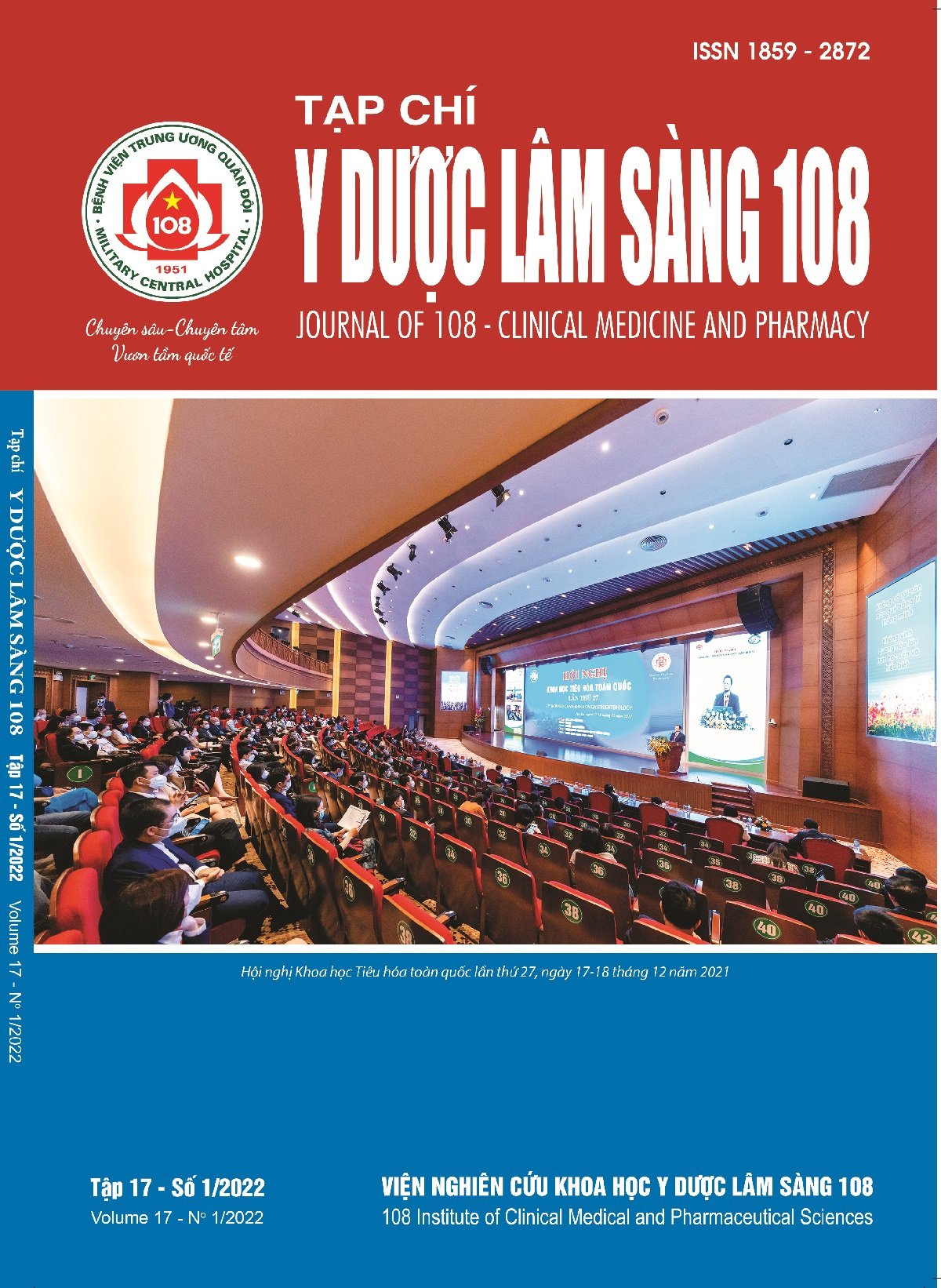Prevalence and genotypes of IL36RN and CARD14 mutation in patients with pustular psoriasis in Vietnam
Main Article Content
Keywords
Abstract
Objective: To identify the prevalence and mutations of IL36RN and CARD14 genes in patients with pustular psoriasis in Vietnam. Subject and method: A cross-sectional descriptive study included 64 patients with pustular psoriasis at Ho Chi Minh City (HCMC) Dermatology Hospital and Hanoi Central Institute of Dermatology. Blood samples (2ml) were collected for sequencing to identify mutations in the IL36RN and CARD14 genes. The process was performed at the Center for Molecular Biomedicine, University of Medicine and Pharmacy at Ho Chi Minh City. Result: The prevalence of IL36RN and CARD14 mutations in patients with pustular psoriasis in Vietnam were 50% and 78.1%, respectively. The rate of IL36RN mutation alone was 15.62%, CARD14 mutation alone was 43.75%, and 34.38% of patients carrying both gene mutations. In the IL36RN gene, the common variations included: c.115+6T>C (32.8%) and c.227C>T (17.2%). Notably, the c.227C>T variation was always accompanied by the c.115+6T>C variation. In the CARD14 gene, the most common varations were c.1641C>T (39.1%), c.1753G>A (28.2%) and c.2458C>T (64.1%). Conclusion: The IL36RN and CARD14 gene mutations account for a relatively high proportion in patients with pustular psoriasis in Vietnam.
Article Details
References
2. Ellingford J, Black G, Clayton T et al (2016) A novel mutation in IL 36 RN underpins childhood pustular dermatosis. Journal of the European Academy of Dermatology and Venereology 30(2): 302-305.
3. Fuchs-Telem D, Sarig O, van Steensel MA et al (2012) Familial pityriasis rubra pilaris is caused by mutations in CARD14. Am J Hum Genet 91(1): 163-70.
4. Fujita H, Terui T, Hayama K et al (2018) Japanese guidelines for the management and treatment of generalized pustular psoriasis: The new pathogenesis and treatment of GPP. J Dermatol 45(11): 1235-1270.
5. Hayashi M, Nakayama T, Hirota T et al (2014) Novel IL36RN gene mutation revealed by analysis of 8 Japanese patients with generalized pustular psoriasis. J Dermatol Sci 76(3): 267-269.
6. Jordan CT, Cao L, Roberson ED et al (2012) PSORS2 is due to mutations in CARD14. The American Journal of Human Genetics 90(5): 784-795.
7. Kanazawa N, Nakamura T, Mikita N et al (2013) Novel IL 36 RN mutation in a J apanese case of early onset generalized pustular psoriasis. The Journal of dermatology 40(9): 749-751.
8. Körber A, Mössner R, Renner R et al (2013) Mutations in IL36RN in patients with generalized pustular psoriasis. The Journal of investigative dermatology 133(11): 2634.
9. Li M, Han J, Lu Z et al (2013) Prevalent and rare mutations in IL-36RN gene in Chinese patients with generalized pustular psoriasis and psoriasis vulgaris. The Journal of investigative dermatology 133(11): 2637.
10. Li M, Han J, Lu Z et al (2013) Prevalent and rare mutations in IL-36RN gene in Chinese patients with generalized pustular psoriasis and psoriasis vulgaris. J Invest Dermatol 133(11): 2637-2639.
11. Mulero JJ, Pace AM, Nelken ST et al (1999) IL1HY1: A novel interleukin-1 receptor antagonist gene. Biochemical and biophysical research communications 263(3): 702-706.
12. Navarini AA, Burden AD, Capon F et al (2017) European consensus statement on phenotypes of pustular psoriasis. J Eur Acad Dermatol Venereol 31(11): 1792-1799.
13. Qin P, Zhang Q, Chen M et al (2014) Variant analysis of CARD14 in a Chinese Han population with psoriasis vulgaris and generalized pustular psoriasis. J Invest Dermatol 134(12): 2994-2996.
14. Setta-Kaffetzi N, Navarini AA, Patel VM et al (2013) Rare pathogenic variants in IL36RN underlie a spectrum of psoriasis-associated pustular phenotypes. The Journal of investigative dermatology 133(5): 1366.
15. Sugiura K (2014) The genetic background of generalized pustular psoriasis: IL36RN mutations and CARD14 gain-of-function variants. Journal of dermatological science 74(3): 187-192.
16. Sugiura K, Muto M, Akiyama M (2014) CARD14 c.526G>C (p.Asp176His) is a significant risk factor for generalized pustular psoriasis with psoriasis vulgaris in the Japanese cohort. J Invest Dermatol 134(6): 1755-1757.
17. Sugiura K, Takemoto A, Yamaguchi M et al (2013) The majority of generalized pustular psoriasis without psoriasis vulgaris is caused by deficiency of interleukin-36 receptor antagonist. Journal of Investigative Dermatology 133(11): 2514-2521.
18. Tauber M, Bal E, Pei XY et al (2016) IL36RN mutations affect protein expression and function: A basis for genotype-phenotype correlation in pustular diseases. J Invest Dermatol 136(9): 1811-1819.
 ISSN: 1859 - 2872
ISSN: 1859 - 2872
